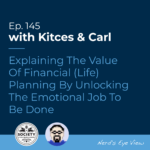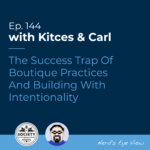
"Building in public" is a common piece of advice for tackling new challenges – whether launching content, starting a business, or setting personal or professional goals – as public commitment fosters accountability and motivation, tapping into the human desire to avoid embarrassment. While this approach can be effective, it ultimately poses its own difficulties; for example, when stakes are public, advisors may feel pressured to endlessly perfect their offerings and over-commit their time and resources before knowing what really works. Alternatively, they may avoid public commitment altogether to sidestep this pressure.
In the 148th episode of Kitces & Carl, Michael Kitces and Carl Richards discuss how advisors looking to try something new can overcome mental roadblocks and take action… without feeling the pressure to publicly announce their plans first.
As a starting point, it may be helpful to remember that, for better or worse… few people pay attention to someone's early public efforts. For example, firm owners often spend an immense amount of time on marketing before referrals or prospects begin to flow in. Most new offerings don't come with a built-in audience. The reality is that, more often than not, recognition for one's 'new' offering tends to come long after the offering was launched, which is why we often hear the phrase about taking 10 years to become an overnight success. On the one hand, it may feel defeating ("What's the point if no one cares?"); on the other, it can feel liberating ("I can build anything I want, and few will notice if I fail.").
The benefit of this slow recognition is that it gives advisors time to refine their product… as long as they start. The desire to create a polished product that matches what clients want is important (and a part of how an advisor has gotten so far) but can also inhibit advisors from getting started in the first place. From that end, it may be helpful for advisors who struggle to start to create a "Version 0" – a version built with release in mind, but not a commitment to a finalized, perfected end product. For example, an advisor creating new video content may record "Version 0" videos, where rather than focusing on perfecting sound, light, and other design elements, they ‘just' turn on their camera and follow a brief script. After recording, they may find that Version 0 is actually good enough to release! And once "Version 0" is out, observing who shows up and engages can inform the advisor about what their audience truly cares about.
The key point is that if advisors can ‘just' begin by iterating new offerings, the process of releasing them gives the advisor space to refine what truly resonates with clients – ultimately leading to a great, relevant product!











